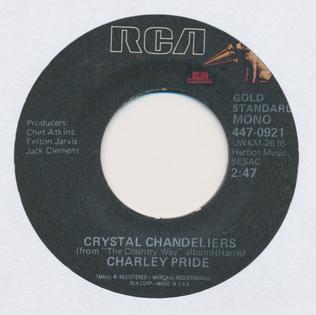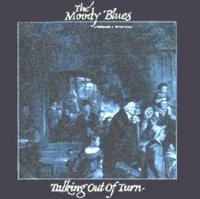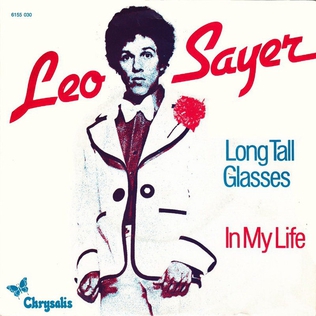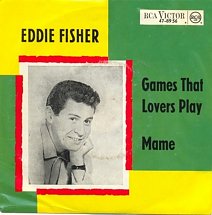
"Crystal Chandelier" is a 1965 Country song written by Ted Harris and popularized by Charley Pride. The original rendition was sung by Carl Belew. His version reached number 12 on the U.S. Billboard Country chart. It was the first of three charting singles from Belew's eighth studio album, Twelve Shades of Belew.

"Deep Inside My Heart" is a song by former Eagles member Randy Meisner, with prominent backing vocal by Kim Carnes. It became a hit in the United States during the summer of 1980, reaching #22 on the Billboard Hot 100. The song was a bigger hit in Canada, where it reached #12.

"That Girl" is a song by American R&B singer and songwriter Stevie Wonder. It was the leading single from Wonder's album-era 1982 greatest-hits compilation, Stevie Wonder's Original Musiquarium I, as one of four newer songs from the collection. The song spent nine weeks at number one on the Billboard R&B singles chart – the longest time a Stevie Wonder single spent at the top spot – and reached number four on the Billboard Hot 100.

"Montego Bay" is a song co-written and performed by Bobby Bloom about the city in Jamaica of the same name. The song was a top 10 hit for Bloom in the Fall of 1970 on both sides of the Atlantic. It reached No. 3 on the UK Singles Chart, No. 5 on the Canadian RPM 100 Singles Chart, No. 7 on the Australian Go-Set Singles Chart and No. 8 on the US Billboard Hot 100. The song was co-written and produced by Jeff Barry. In the master tape of the song, Bloom breaks into a chorus of "Oh, What a Beautiful Mornin'" at the end of the recording. The song features a whistler, as well as Jamaican instruments in a calypso style.

"This Masquerade" is a song written by American singer and musician Leon Russell. It was originally recorded in 1972 by Russell for his album Carney and as a B-side for the album's hit single "Tight Rope". The song was then covered on Helen Reddy's 1972 album, I Am Woman. It was then recorded by American vocal duo, the Carpenters, for their 1973 album Now & Then and as the B-side of the Carpenters's single "Please Mr. Postman". Three years later, "This Masquerade" was recorded by American singer and guitarist George Benson, who released it on his 1976 album, Breezin'. Benson's version, featuring Jorge Dalto on piano, was released as a single and became the first big hit of his career.

"Love Ballad" is a song by R&B/Funk band L.T.D. Jeffrey Osborne is the lead singer.

"Talking Out of Turn" is a 1981 single by the English progressive rock band the Moody Blues. It was the third and final single released from their 1981 album Long Distance Voyager.

"Love or Let Me Be Lonely" is a pop song recorded by the soul group The Friends of Distinction and released as a single in early 1970. The song was a multi-format success, peaking in the top 10 of the Billboard Hot 100 at #6 on May 1, 1970 and at #13 on the R&B chart. On the Adult Contemporary singles charts, "Love or Let Me Be Lonely" went to #9. The song is ranked as the 63rd biggest hit of 1970.

"Gypsy Woman" is a 1961 rhythm and blues song written by Curtis Mayfield and recorded by his group the Impressions. The group's first single following the departure of lead singer Jerry Butler, it reached No. 2 on the US Billboard R&B chart, No. 20 on the Billboard Hot 100 and number 17 on the Cash Box chart. It also appeared on the group's 1963 eponymous debut album. Joe Bataan (1967), Brian Hyland (1970), Bobby Womack (1985), and Santana (1990) covered this song.

"Stormy" is a hit song by the Classics IV released on their LP Mamas and Papas/Soul Train in 1968. It entered Billboard Magazine October 26, 1968, peaking at #5 on the U.S. Billboard Hot 100 chart and #26 Easy Listening. The final line of the chorus has the singer pleading to the girl: "Bring back that sunny day". The single, along with the prior release of "Spooky" and, soon after, the release of "Traces", formed a trio of solid hits for the band.

"Really Wanna Know You" is a 1981 song by Gary Wright that was a hit single in the U.S., reaching No. 16 on the Billboard Hot 100. It was taken from the album The Right Place. The song spent 17 weeks on the chart and became Wright's third biggest U.S. hit. It was his final charting single.

"Long Tall Glasses (I Can Dance)" is a 1974 song by Leo Sayer, co-written with David Courtney. It was released in the United Kingdom in late 1974, becoming Sayer's third hit record on both the British and Irish singles charts and reaching number four in both nations. It was included on Sayer's album Just a Boy.

"My Uncle Used to Love Me But She Died" is a 1966 song by Roger Miller. It was the fourth of four singles released from Miller's fourth LP, Words and Music, all of which became U.S. Top 40 Country hits.

"Mr. Dieingly Sad" is a 1966 song by the Critters. It was written by Don Ciccone, who also provides the lead vocals. The song was the second of two singles released from their album Younger Girl, the other being the title track.

"Melanie Makes Me Smile" is a 1970 song written by Barry Mason and Tony Macaulay. It became a top 10 hit in Australia in early 1970 by the Strangers.

"Games That Lovers Play" is a popular song composed by James Last which became a hit for multiple artists in 1966 and 1967. The song has been recorded more than 100 times.

"Rainy Jane" is a song written and originally recorded by Neil Sedaka in 1969, covered two years later by Davy Jones. Sedaka's rendition became a minor hit in the U.S., Canada and Australia.

"Only You Know and I Know" is a song written and originally recorded by Dave Mason in 1970. It is a track from his LP, Alone Together. The song was his first charting single, and it became a modest hit for him in the U.S. and Canada.

"I Got to Know" is a song recorded by the American band Starbuck. It was the second of three singles from their debut LP, Moonlight Feels Right. Written and produced by Bruce Blackman, the song was released in September 1976. Like its predecessor, "Moonlight Feels Right," the song features a prominent marimba solo by co-founding band member Bo Wagner.

"The Drum" is a song recorded by Bobby Sherman from his Portrait Of Bobby LP. It was released as a single in the spring of 1971, the second of two from the album. The song was written by Alan O'Day, his first of five Top 40 chart credits.





















